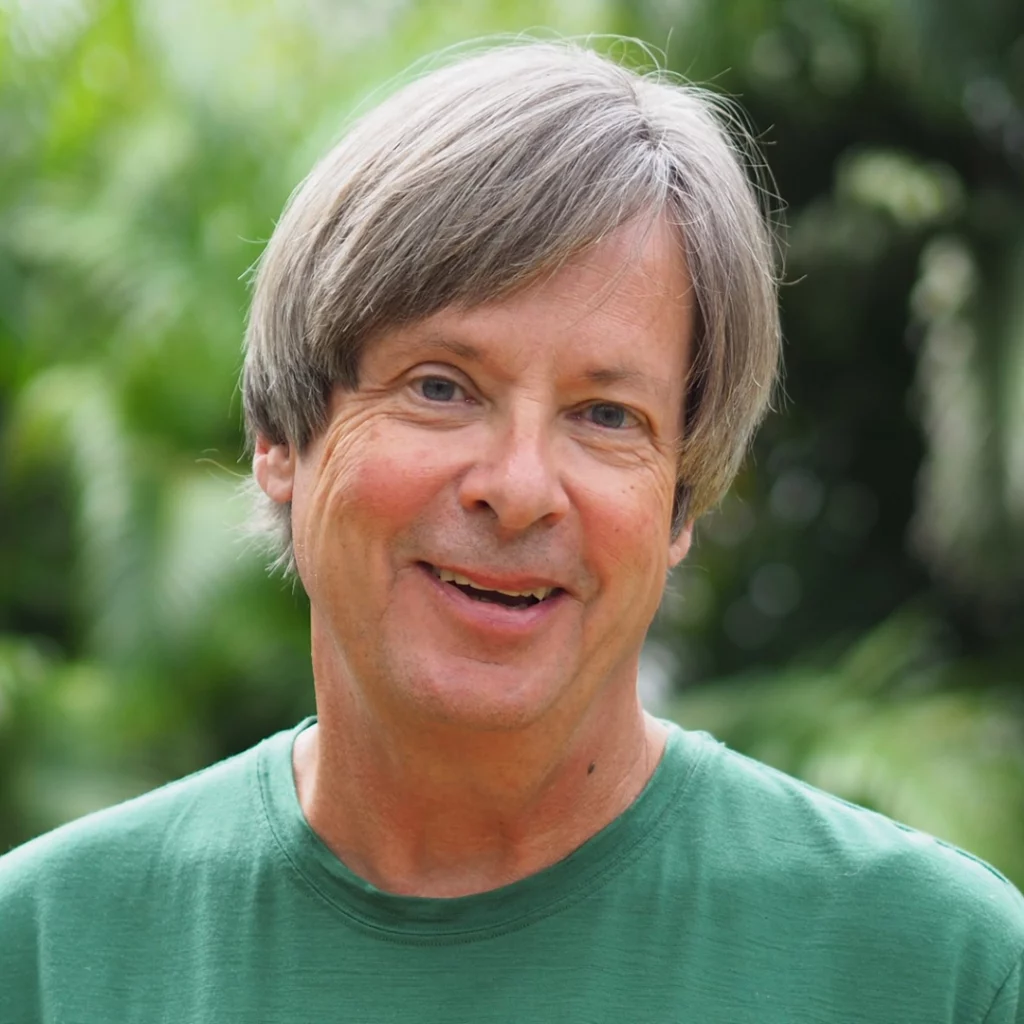The Serious Business of Being Silly with Dave Barry
Pulitzer Prize-winning columnist and author Dave Barry shares about his childhood, career at The Miami Herald and his latest book, "Class Clown."

Dave Barry made the wise decision to leave the chilly climes of Pennsylvania, where he got his start writing for the afternoon paper the Daily Local News, for sunny South Florida in 1986. His humor pieces had occasionally found a home in small and medium-sized newspapers in the Northeast, but his national readership came after appearing first in The Philadelphia Inquirer and then in The Miami Herald. The two Knight Ridder papers both offered him a full-time job as a columnist, but Barry preferred the relaxed deadline pace that came with the Florida position. By the time Barry moved to Miami at 39, he was several years into writing for the Herald, and had fully embraced the weirdness and wackiness of his new home to eventually fill volume after volume of best-selling books. Syndicated to about 500 newspapers before ending in 2005, Barry’s column was seldom serious. There were exceptions, of course, such as when he wrote about his last visit with his father and his mother’s death by suicide. His ability to balance life and levity earned Barry the Pulitzer Prize for commentary. Now, more than a half-century since he filed his first humor column, Barry is telling his own tale with the publication of an autobiography, “Class Clown: The Memoirs of a Professional Wiseass.” Flamingo spoke to Barry, appropriately enough, on April Fool’s Day.
You were in Pennsylvania for years writing for the Herald’s Tropic magazine, and then you finally moved to Florida. What was the deciding factor in making that jump?
Dave Barry: Well, it was kind of a gradual thing, but I had come to love Miami. At first, I was terrified of Miami and found it just weird and scary and no place to raise a child. But I was basically seeing downtown Miami, and the airport. Busy, frantic, Cocaine Cowboy Miami, and I didn’t know there were nice neighborhoods in Miami. But when I would come down to do stories for the Herald, I got to know (the city) a little bit better, and then I kind of liked it. It was different. And I liked the weather at least some of the time, most of the time. The Herald was happy to have me come down and be part of it.
You wrote “Dave Barry turns 40” and “Dave Barry Turns 50.” Don’t you think you owe your readers “Dave Barry Turns 60” and “Dave Barry Turns 70”?
DB: This (autobiography) kind of is “Dave Barry Turns 77.” I didn’t write “Dave Barry Turns 60,” just because I felt like, okay, what am I going to say? I’m still old. I’ve already written that twice.
What made you decide to write an autobiography?
DB: Really my editor, Priscilla Painton at Simon & Schuster. When I finished the last book, which was a novel, we were talking about what should the next book be. And at the time, there was just a lot of memoiring going on. I don’t really remember whether she brought it up or I brought it up, but right away I liked the idea, and she liked it a lot. That’s what she wanted me to do. Then I kind of had to deal with—and I’m still dealing with—the idea (of) well, is this, like a narcissistic thing? Who cares about what my childhood was like? My career has consisted of entertaining people, but not really telling them that much about myself. Humor really is sort of a defense against telling people about yourself. I did worry, and still worry, that it’s going to look too much like just a purely narcissistic project. I hope it doesn’t come off that way. I’m hoping that people find value in it, but that’s my fear.
How did growing up in a household with alcoholism and depression help shape you?
DB: I had a really happy childhood. I did not have two perfectly happy, you know, well-adjusted parents. They both had issues, but they were both really funny. They were both really loving. They both would have done anything for their kids. My parents’ issues didn’t really become significant in my life until I was grown. I mean, I was aware that my mom was unhappy sometimes, but I was more aware that my mom was really funny a lot of the time, very smart (and) just fun to be around. My dad’s drinking problem didn’t really surface till I was at college, and my mom’s brutal depression issues didn’t surface until my dad died, and by then I was grown. I really feel I was formed in a kind of a happy environment, even though, as I write, my parents had major problems.
You write that you feel guilty about your mother’s death, but that the dominant emotion you feel is gratitude. Can you expound on that?
DB: I was quite sure that I knew what was best for my mom, and obviously I didn’t. I didn’t know at all what was best for her, nor did I know what she was going through or how serious it was. I’ll always feel guilty about that, although I know she wouldn’t hold it against me, because she was not like that. But as far as the gratitude is concerned, I can entirely trace my sense of humor to her. There is no question in my mind that what she thought was funny is the kind of thing that I think is funny. She was really good at spotting pomposity and hypocrisy, and she was really good at not taking things seriously that you were supposed to take seriously. I definitely inherited that from her.
What was the hardest part of retiring your column?
DB: Nothing. (laughs) It was really easy. I was done, and I didn’t feel as though I had any goal to achieve. I never really was one for milestones and professional achievements anyway. I mean to me, my whole career was just a very lucky thing. I had a wonderful career. I have a Substack now, along with everybody else in the world, so I kind of write a column again, but it’s much more relaxed. I mean, I can write whenever I feel like it. There’s no particular length constraint. It’s gonna be pretty random. My column was too, but it had to be once a week, and it had to be this many words, and it had to conform to newspaper standards, and none of that happens on Substack. I felt like I could stop, put down the kind of endless grind of always having a column due, but not totally give up on writing. So, it’s been nice.
What do you think about when you drive past the space where the Miami Herald building used to be?
DB: I’m sad. My wife is a newspaper reporter. She’s a sportswriter for the Herald, and so her life has been newspapers. Mine was always newspapers. We know newspaper people all over the country, and just to see the utter collapse of what was a magnificent business that had so many really smart, great people, to watch it just evaporate the way it has in the last couple of decades is so depressing. The Herald has an office, but it’s on a something floor of a building, and it’s nothing like what it was.
You’ve been a part of some very prestigious organizations, including the Rock Bottom Remainders, (an amateur rock band whose members included fellow authors like Stephen King, Scott Turow, Barbara Kingsolver and more). You’ve written for the Oscars, and you set things on fire twice on Late Night with David Letterman.
DB: True. All true.
So can booger jokes be a stepping stone for other people or just for you?
DB: Look, people really like humor. They do. They respond to it. It’s much more likely now that they’re going to find it on Twitter or whatever it’s called—X, I guess—or on somebody’s Substack. Not at all in newspaper columns anymore. But yeah, people who are funny, I think, can still find a way, if they find the right medium to—I hate to use this word—but to monetize it, and therefore be able to eat. It’s just trickier than it used to be.
Who makes you laugh?
DB: Nate Bargatze. He’s a comedian, a standup comic. I think he’s wonderful. I think he’s brilliant, and he does it without ever being either political or sexual. He’s just very funny. There’s a purity to what he does that I find admirable.
Do you think you’ll ever just stop writing?
DB: Oh, no, I don’t think I could. I like to do it. And kind of my immediate response to almost everything that happens is, “Maybe I could write about that,” so I don’t see myself stopping. I mean, I’m too old to stop.
So, how would you like to be remembered, Dave?
DB: This is not false modesty. I don’t think I will be remembered at all. People who like me will remember me, and that will be that, but I don’t think I’ll have any kind of an enduring literary legacy. I say this because my idol when I was young was Robert Benchley, a brilliant humorist. People still talk about Mark Twain, who was never on his best day as funny as Robert Benchley, in my opinion. But he was more literary and more memorable, and I’m not. I’m not a literary humorist. I’m a silly humorist, but Robert Benchley was like that, and so I figured that’s my legacy. I’ll be funny, amusing to the people who read me while I was still alive, but that’s pretty much going to be the end of it, which is fine with me. I don’t mean that in any way to be like, “Oh, that’s unfair.” But that’s the way it is with humor. It tends to be dated and tends to lose its freshness to people and they move on.







